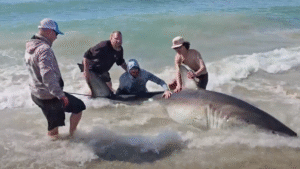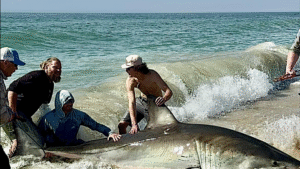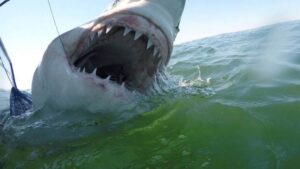Shark Attack in North Carolina Outer Banks Results in Fatalities Among Fisherman and Officials
June 5, 2025 — Outer Banks, NC — A deadly shark attack off the coast of North Carolina’s Outer Banks has resulted in multiple fatalities, including a commercial fisherman and a responding marine safety officer, in what authorities are calling a “rare but catastrophic” ocean incident.
The attack occurred early Wednesday morning, approximately two miles off the coast near Oregon Inlet, where a small fishing vessel was operating during routine tuna fishing. According to the U.S. Coast Guard, the crew of the vessel “Carolina Spirit” was hauling in lines when a large shark — believed to be a great white measuring more than 12 feet in length — began circling the boat.
Eyewitness accounts from surviving crew members suggest the shark displayed unusually aggressive behavior. “It just came out of nowhere,” said crew member Jason Foley. “One minute we were working the lines, the next minute the water exploded beside the boat.”
The shark reportedly latched onto one of the fishermen who had been leaning over the gunwale, pulling him partially into the water. A second crewmember who attempted to assist was also bitten. Emergency radio distress signals were sent out, prompting a rapid response from the U.S. Coast Guard and North Carolina Marine Patrol.
Upon arrival, rescue personnel engaged in what officials described as an “extremely high-risk recovery operation.” While pulling the wounded men to safety, the shark continued circling the vessel. One of the marine officers, identified as Lieutenant Bradley Connors, 42, was attacked after entering the water in an attempt to distract the animal.
Lieutenant Connors suffered catastrophic injuries and was pronounced dead at the scene. The fisherman initially attacked, 51-year-old Michael Bennett of Wanchese, also succumbed to his injuries shortly after being airlifted to Sentara Norfolk General Hospital.
“This was a horrific and tragic event,” said Rear Admiral Thomas Garrison of the U.S. Coast Guard’s Fifth District. “Lieutenant Connors gave his life in the line of duty, performing a heroic act that undoubtedly saved others.”
This is the first fatal shark attack in the Outer Banks since 2011 and the first on-record incident involving the death of a responding official in a marine wildlife event in state waters.
Shark attacks are extremely rare in North Carolina waters, and great white sharks — while known to occasionally migrate through the area — typically avoid human interaction. Marine biologists from Duke University’s Marine Lab are assisting in identifying the shark responsible using bite pattern analysis and drone surveillance.
Dr. Kendra Hall, a shark behavior expert, emphasized that the attack is an anomaly. “Sharks are not the mindless predators they’re often portrayed to be. This level of aggression suggests the animal may have been injured, disoriented, or competing for limited food sources.”
In the wake of the incident, state officials have temporarily closed beaches and suspended recreational and commercial fishing within a 5-mile radius of the attack. Patrols and spotter planes have been deployed to monitor shark activity in the area.
Governor Elaine Forrester issued a formal statement expressing condolences to the families of those lost. “We are heartbroken by this tragedy. Our thoughts are with the loved ones of Lt. Connors and Mr. Bennett, and we thank the brave men and women who continue to safeguard our shores.”
A memorial service for Lieutenant Connors is scheduled for Saturday in Manteo, where he lived with his wife and two children. Flags at state facilities across the Outer Banks have been lowered to half-staff in his honor.
Meanwhile, the fishing community in Wanchese — where both men were well known — is reeling from the loss. “We go out every day knowing the risks of the sea,” said Captain Raymond Holt, a longtime fisherman and friend of Bennett. “But nothing prepares you for something like this.”
Investigators are working with NOAA and local marine biologists to determine whether environmental factors, such as warming ocean temperatures or disrupted migration patterns, played a role in the shark’s behavior.
For now, a stunned coastal community is left grieving and searching for answers after an event both rare and deeply tragic.













